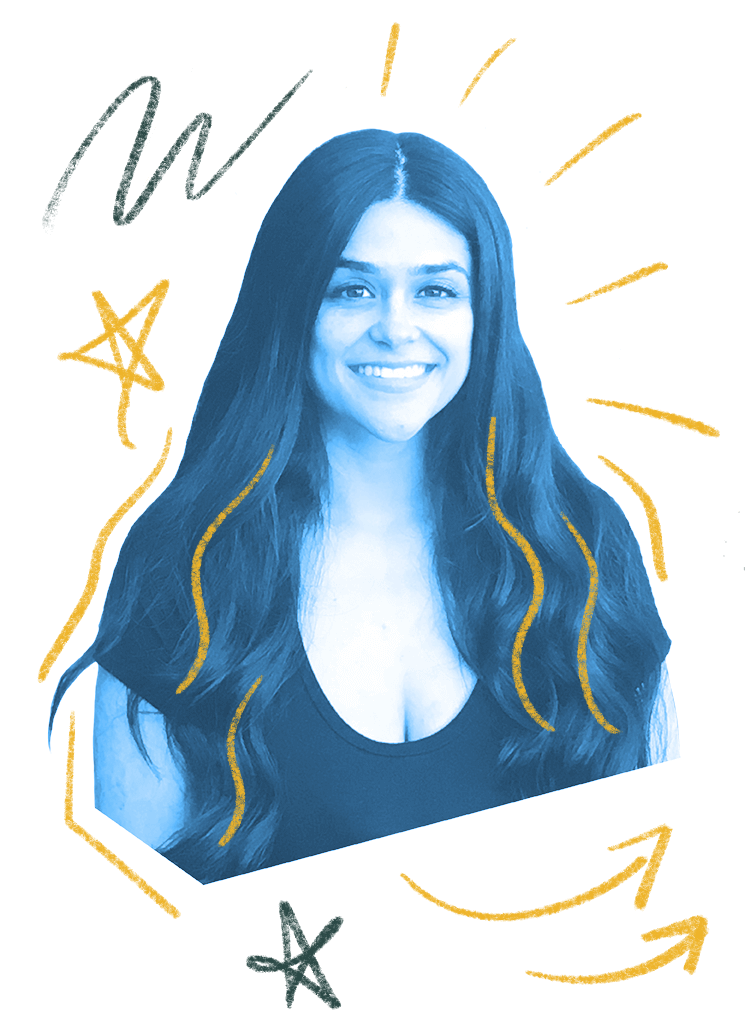Patient Insider
Patient InsiderHi, I'mAimeeFeeling overwhelmed by PsA?At first, I was too.

My diagnosis was a BIG deal
I was 21 when I first noticed something wasn’t right – constant aches and spots from head to toe. I’d come home from work and go straight to bed. I was too tired to socialize.
I assumed my symptoms were stress related. But after grabbing my joints and noticing inflammation, my doctor said: “Oh, you have psoriatic arthritis.”
Those words terrified me. I didn’t even know PsA existed. My father had rheumatoid arthritis, but I was so much younger than him. I wasn’t sure what treatment could help or what the rest of my life would look like.
“24/7 chronic pain completely drains my energy.”
I used to call myself a lemon
My dad was big into cars. That’s where the concept of a “lemon” came from – it’s a car that doesn’t function properly but you’re stuck with it. So in my family, we referred to anything that didn’t work right or dragged people down as a lemon.
I got to the point where I believed I was a lemon. Psoriatic arthritis made it hard to simply get out of bed, shower, or brush my teeth. My body felt defective. I was single for a long time because I didn’t want anyone to have to deal with me. I always worried I wouldn’t meet their expectations.
People in my life eventually got tired of me calling myself a lemon. I got fed up with it, too.
My first step toward acceptance: letting go of the anger and embarrassment. Why was I blaming myself for something I couldn’t control?
Embracing PsA isn’t easy – it requires patience. But think of it as a yucky people detector. If a friend, employer, or significant other acts like your tough days are a burden, they may not be worth your time. Scared to show your skin because someone might say it’s gross? Responding with “It’s an autoimmune disorder – you can’t catch it” can be enlightening.
Psoriatic arthritis can be unpredictable. Here’s a trick I discovered that helps me stay present and enjoy more of my life.

Managing PsA is a mind-body experience
My physical and mental health go hand-in-hand. When I’m stressed, my body feels it. When I’m in pain, my brain goes into negative self-talk mode.
I cope by checking in with myself. Did I get enough sleep? Am I anxious? What’s my pain level right now? Sometimes I ask my loved ones if they’ve noticed any changes. I jot everything down on my phone so I’m prepared to talk to my rheumatologist or dermatologist.
My biggest tip: acknowledge how you feel physically, mentally, and emotionally. It's okay to give your feelings a moment.
Ditching the self-care guilt
I always make sure to put myself and my health first. My body ends up paying the price when I don’t.
How do I prioritize my needs? Rest when I’m tired. Set realistic expectations, especially when I don’t feel great. Tell others how they can support me. Most importantly, I empower myself by saying no.
Kick the habit of feeling guilty for doing what’s best for you. Attend the event if you’re up to it. Don’t push yourself beyond your limits. Sometimes it’s going to be a pain to ask for accommodations in advance or to bring your biologic in a cooler. You’re not high maintenance – you’re setting yourself up for success.
“I choose what I focus my attention on and put my energy into. That’s how I take my power back.”

My
Reading List
These articles resonate with me. Maybe they will for you, too.
- 4 Things to Consider When Choosing A Mobility Aid For Psoriatic Arthritis
- My Expectations of Living Well with Psoriatic Arthritis
- Psoriatic Disease Gave me Thick Skin
- Encouragement Can Come From The Strangest Places
Oh, and follow more of my story.